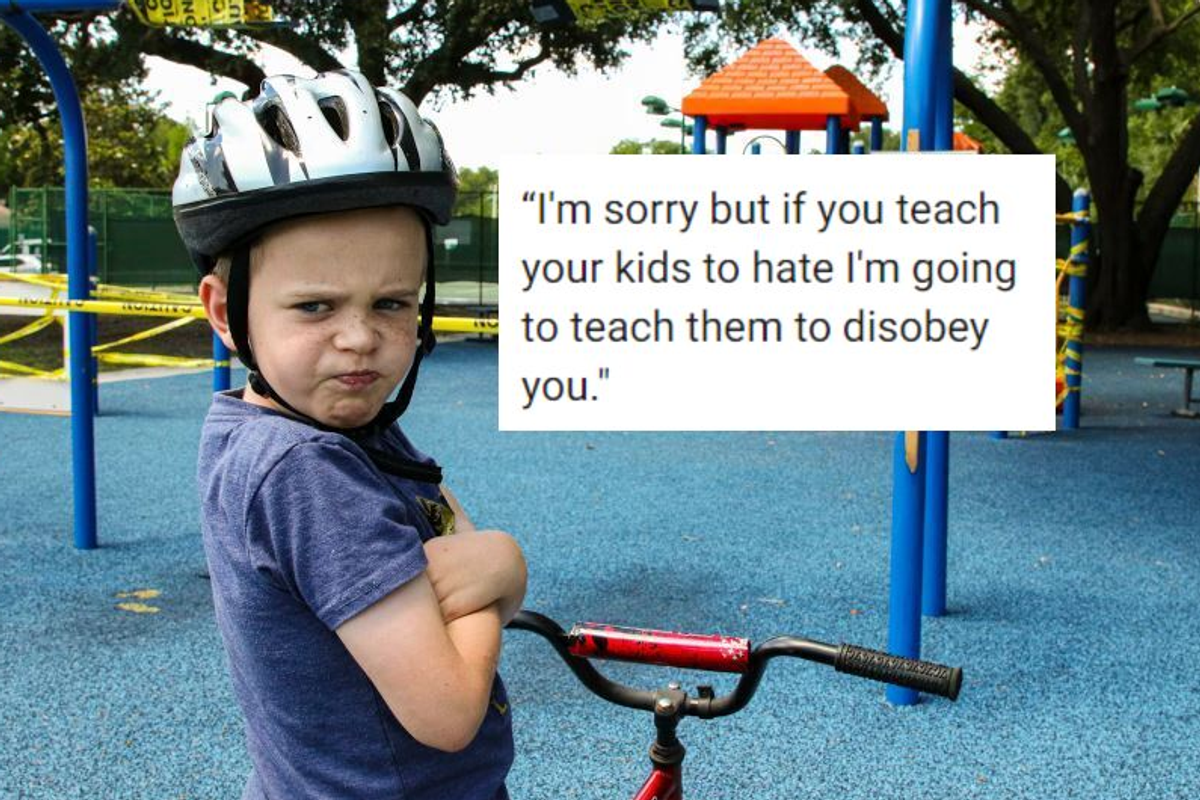Gay dad has a forceful response to 7-year-old who called gay people 'the devil'
But some say the dad's words went way too far.
Robbie Pierce, his husband, Neal Broverman are no strangers to bigotry. The men and their two young children were traveling on an Amtrak train in California in 2022 when they were harassed by a fellow passenger at a stop in San Jose; an incident that made headlines.
"All of a sudden, there was a man standing there next to me," Pierce told The Advocate. The man told their son, "Remember what I told you earlier. They stole you and they're pedophiles," Pierce recounts. The man also said that gay people are abominations. (Broverman is the editorial director for print media at Pride, The Advocate's parent company.)
The police were called and the man was thrown off the train, but the incident was a frightening reminder that gay families could be the target of bigots any time and anywhere, even in liberal Northern California. "It's a new level of homophobia out there," Pierce added.
Seven months later, Pierce’s son was the victim of harassment, this time from a child at a park.

"A random unattended 7-year-old at the park told me and my son that gay people are the devil,” he recounted in a viral X thread. "My son scoffed, but the boy said it was true because God said so."
Maybe it was the incident months prior. Maybe it was a lifetime of harassment and judgment. But whatever it was, in that moment, Pierce had had enough. He reacted to the boy’s hatred — which he probably learned at home — with his own lesson.
“I told him parents made up God to make their Kids do what they want. His eyes got so big,” he wrote on X.
It's worth wondering: Did God really 'say so'? Biblical scholars are split on the Bible's true message around homosexuality. It appears open to interpretation, and it's clear that many people choose to interpret the words in a hateful and negative way, going so far as to show their children that it's OK to approach and confront gay people over their identities.
Addressing complex issues like religion and sexuality with a young child, who’s a stranger, is a tricky needle to thread, so Pierce admits he had some reservations about his response. But he stands by his decision.
“I'm sorry but if you teach your kids to hate I'm going to teach them to disobey you," he wrote on X.
As someone who has been harassed by religious, homophobic people in the past, Pierce took the opportunity to help steer a young child away from hatred. At the age of 7, most children believe whatever their parents tell them. However, Pierce planted a seed in the child’s mind that may one day encourage him to challenge his indoctrination when he gets older. The kid will likely remember that interaction for many years to come, and may look back at it with shame one day. That shame could be the much-needed catalyst for change.
"I was shocked at first and then...well...you may have planted a seed to grow a fine human out of the little homophobic bigot he was being trained up as. I can't argue with that," one user wrote on X.
The vast majority of commenters on X agreed with Pierce’s response to the child’s comment.
However, some people thought Pierce’s response to the child was inappropriate.
Bigoted words or not, it was still a child, and many people thought there may have been a more tactful way to teach the kid a lesson rather than invalidating his entire faith. Or perhaps Pierce could have tracked down the boy's parents and given them an earful instead.
One thing is clear: Something in our culture is definitely broken when we're more intent on policing people's responses to bigotry and hate versus addressing the root cause of these divides. The boy's parents should be the one on trial in the court of public opinion for teaching their son that this kind of behavior is acceptable.
No matter how one feels about Pierce’s reaction, what’s clear is that there is something very inappropriate about a 7-year-old child openly harassing LGBTQ families. The unfortunate problem is that this type of hyper-religious upbringing can cause lasting emotional and psychological trauma to a child. And it’s a common problem. A recent study in the growing field of religious trauma found that 1 in 3 Americans suffer from trauma related to religion at some point in their life.
While we might be quick to dismiss the child’s behavior as innocent or simply as a symptom of growing up in a religious household, the more we learn about religious trauma, the more these children appear to be the victims of abuse. Hopefully Pierce's words will help the boy rethink his relationship with his faith, and his parents, down the road.
This article originally appeared last year. It has been updated.

